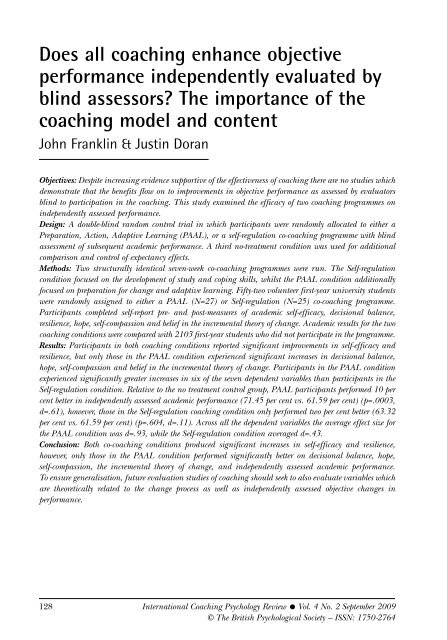International Coaching Psychology Review, 4.2, September 2009
International Coaching Psychology Review, 4.2, September 2009
International Coaching Psychology Review, 4.2, September 2009
You also want an ePaper? Increase the reach of your titles
YUMPU automatically turns print PDFs into web optimized ePapers that Google loves.
Does all coaching enhance objective<br />
performance independently evaluated by<br />
blind assessors? The importance of the<br />
coaching model and content<br />
John Franklin & Justin Doran<br />
Objectives: Despite increasing evidence supportive of the effectiveness of coaching there are no studies which<br />
demonstrate that the benefits flow on to improvements in objective performance as assessed by evaluators<br />
blind to participation in the coaching. This study examined the efficacy of two coaching programmes on<br />
independently assessed performance.<br />
Design: A double-blind random control trial in which participants were randomly allocated to either a<br />
Preparation, Action, Adaptive Learning (PAAL), or a self-regulation co-coaching programme with blind<br />
assessment of subsequent academic performance. A third no-treatment condition was used for additional<br />
comparison and control of expectancy effects.<br />
Methods: Two structurally identical seven-week co-coaching programmes were run. The Self-regulation<br />
condition focused on the development of study and coping skills, whilst the PAAL condition additionally<br />
focused on preparation for change and adaptive learning. Fifty-two volunteer first-year university students<br />
were randomly assigned to either a PAAL (N=27) or Self-regulation (N=25) co-coaching programme.<br />
Participants completed self-report pre- and post-measures of academic self-efficacy, decisional balance,<br />
resilience, hope, self-compassion and belief in the incremental theory of change. Academic results for the two<br />
coaching conditions were compared with 2103 first-year students who did not participate in the programme.<br />
Results: Participants in both coaching conditions reported significant improvements in self-efficacy and<br />
resilience, but only those in the PAAL condition experienced significant increases in decisional balance,<br />
hope, self-compassion and belief in the incremental theory of change. Participants in the PAAL condition<br />
experienced significantly greater increases in six of the seven dependent variables than participants in the<br />
Self-regulation condition. Relative to the no treatment control group, PAAL participants performed 10 per<br />
cent better in independently assessed academic performance (71.45 per cent vs. 61.59 per cent) (p=.0003,<br />
d=.61), however, those in the Self-regulation coaching condition only performed two per cent better (63.32<br />
per cent vs. 61.59 per cent) (p=.604, d=.11). Across all the dependent variables the average effect size for<br />
the PAAL condition was d=.93, while the Self-regulation condition averaged d=.43.<br />
Conclusion: Both co-coaching conditions produced significant increases in self-efficacy and resilience,<br />
however, only those in the PAAL condition performed significantly better on decisional balance, hope,<br />
self-compassion, the incremental theory of change, and independently assessed academic performance.<br />
To ensure generalisation, future evaluation studies of coaching should seek to also evaluate variables which<br />
are theoretically related to the change process as well as independently assessed objective changes in<br />
performance.<br />
128 <strong>International</strong> <strong>Coaching</strong> <strong>Psychology</strong> <strong>Review</strong> ● Vol. 4 No. 2 <strong>September</strong> <strong>2009</strong><br />
© The British Psychological Society – ISSN: 1750-2764

















